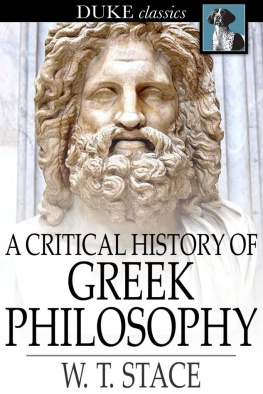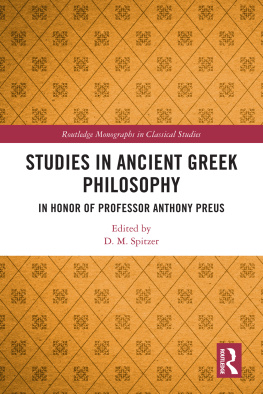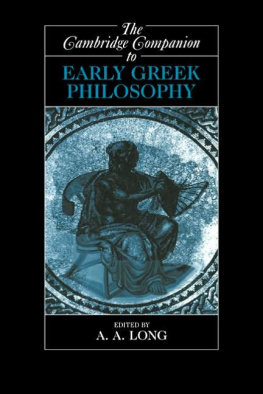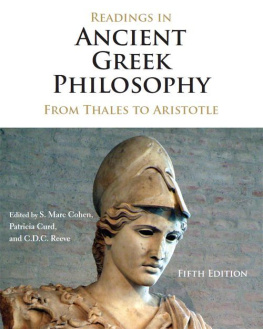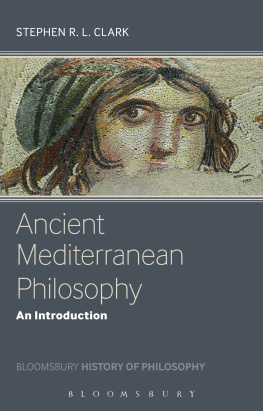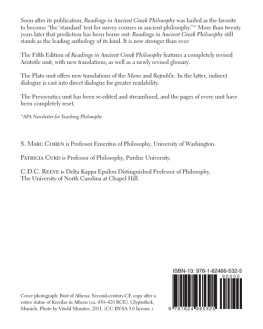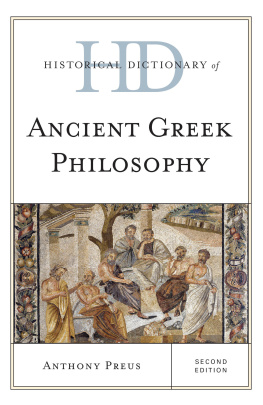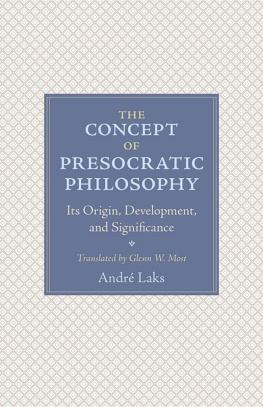A CRITICAL HISTORY OF GREEK PHILOSOPHY
* * *
W. T. STACE
*
A Critical History of Greek Philosophy
First published in 1920
ISBN 978-1-62012-295-2
Duke Classics
2012 Duke Classics and its licensors. All rights reserved.
While every effort has been used to ensure the accuracy and reliability of the information contained in this edition, Duke Classics does not assume liability or responsibility for any errors or omissions in this book. Duke Classics does not accept responsibility for loss suffered as a result of reliance upon the accuracy or currency of information contained in this book.
Contents
*
Preface
*
This book contains the substance, and for the most part the words, ofa course of public lectures delivered during the first three months of1919. The original division into lectures has been dropped, the matterbeing more conveniently redivided into chapters.
The audience to whom the lectures were delivered was composed ofmembers of the general public, and not only of students. For the mostpart they possessed no previous knowledge of philosophy. Hence thisbook, like the original lectures, assumes no previous specialknowledge, though it assumes, of course, a state of general educationin the reader. Technical philosophical terms are carefully explainedwhen first introduced; and a special effort has been made to putphilosophical ideas in the clearest way possible. But it must beremembered that many of the profoundest as well as the most difficultof human conceptions are to be found in Greek philosophy. Such ideasare difficult in themselves, however clearly expressed. No amount ofexplanation can ever render them anything but difficult to theunsophisticated mind, and anything in the nature of "philosophy madeeasy" is only to be expected from quacks and charlatans.
Greek philosophy is not, even now, antiquated. It is not from thepoint of view of an antiquary or historian that its treasures arevaluable. We are dealing here with living things, and not with meredead thingsnot with the dry bones and debris of a bygone age. And Ihave tried to lecture and write for living people, and not for merefossil-grubbers. If I did not believe that there is to be found here,in Greek philosophy, at least a measure of the truth, the truth thatdoes not grow old, I would not waste five minutes of my life upon it.
"We do not," says a popular modern writer, "bring theyoung mind up against the few broad elemental questions that are thequestions of metaphysics .... We do not make it discuss, correct it,elucidate it. That was the way of the Greeks, and we worship thatdivine people far too much to adopt their way. No, we lecture to ouryoung people about not philosophy but philosophers, we put themthrough book after book, telling how other people have discussed thesequestions. We avoid the questions of metaphysics, but we deliversemi-digested half views of the discussions of, and answers to thesequestions made by men of all sorts and qualities, in various remotelanguages and under conditions quite different from our own.... Itis as if we began teaching arithmetic by long lectures upon the originof the Roman numerals, and then went on to the lives and motives ofthe Arab mathematicians in Spain, or started with Roger Bacon inchemistry, or Sir Richard Owen in comparative anatomy .... It is timethe educational powers began to realise that the questions ofmetaphysics, the elements of philosophy, are, here and now to be doneafresh in each mind .... What is wanted is philosophy, and not ashallow smattering of the history of philosophy ... The properway to discuss metaphysics, like the proper way to discuss mathematicsor chemistry, is to discuss the accumulated and digested product ofhuman thought in such matters."
Plausible words these, certain to seem conclusive to the mob,notwithstanding that for one element of truth they contain nine ofuntruth! The elements of truth are that our educational systemunwarrantably leaves unused the powerful weapon of oral discussionsoforcibly wielded by the Greeksand develops book knowledge at theexpense of original thought. Though even here it must be remembered,as regards the Greeks, (1) that if they studied the history ofphilosophy but little, it was because there was then but littlehistory of philosophy to study, and (2) that if anyone imagines thatthe great Greek thinkers did not fully master the thought of theirpredecessors before constructing their own systems, he is grievouslymistaken, and (3) that in some cases the over-reliance on oraldiscussionthe opposite fault to oursled to intellectualdishonesty, quibbling, ostentation, disregard of truth, shallowness,and absence of all principle; this was the case with the Sophists.
As to the comparisons between arithmetic and philosophy, chemistry andphilosophy, etc., they rest wholly upon a false parallel, and involvea total failure to comprehend the nature of philosophic truth, and itsfundamental difference from arithmetical, chemical, or physical truth.If Eratosthenes thought the circumference of the earth to be so much,whereas it has now been discovered to be so much, then the latercorrect view simply cancels and renders nugatory the older view. The one is correct, the other incorrect. We can ignore andforget the incorrect view altogether. But the development ofphilosophy proceeds on quite other principles. Philosophical truth isno sum in arithmetic to be totted up so that the answer is thusformally and finally correct or incorrect. Rather, the philosophicaltruth unfolds itself, factor by factor, in time, in the successivesystems of philosophy, and it is only in the complete series that thecomplete truth is to be found. The system of Aristotle does not simplycancel and refute that of Plato. Spinoza does not simply abolishDescartes. Aristotle completes Plato, as his necessary complement.Spinoza does the same for Descartes. And so it is always. Thecalculation of Eratosthenes is simply wrong, and so we can afford toforget it. But the systems of Plato, Aristotle, Spinoza, Leibniz,etc., are all alike factors of the truth. They are as true now as theywere in their own times, though they are not, and never were, thewhole truth. And therefore it is that they are not simply wrong, donewith, finished, ended, and that we cannot afford to forget them.Whether it is not possible to bring the many lights to a single focus,to weld the various factors of the truth into a single organic wholeor system, which should thus be the total result to date, is anotherquestion. Only one such attempt has ever been made, but no one willpretend that it is possible to understand it without a thoroughknowledge of all previous systems, a knowledge, in fact, of theseparate factors of the truth before they are thus combined into atotal result. Besides, that attempt, too, is now part of the historyof philosophy!
Hence any philosophical thinking which is not founded upon athorough study of the systems of the past will necessarily be shallowand worthless. And the notions that we can dispense with this study,and do everything out of our own heads, that everyone is to be his ownphilosopher, and is competent to construct his own system in his ownwaysuch ideas are utterly empty and hollow. Of these truths, indeed,we see a notable example in what the writer just quoted styles his"metaphysic." This so-called metaphysic is wholly based upon theassumption that knowledge and its object exist, each on its ownaccount, external to one another, the one here, the other there overagainst it, and that knowledge is an "instrument" which in thisexternal manner takes hold of its object and makes it its own. Thevery moment the word "instrument" is used here, all the rest,including the invalidity of knowledge, follows as a matter of course.Such assumption thenthat knowledge is an "instrument"our writermakes, wholly uncritically, and without a shadow of right. He gives nosign that it has ever even occurred to him that this is an assumption,that it needs any enquiry, or that it is possible for anyone to thinkotherwise. Yet anyone who will take the trouble, not merelysuperficially to dip into the history of philosophy, but thoroughly tosubmit himself to its discipline, will at least learn that this is anassumption, a very doubtful assumption, too, which no one now has theright to foist upon the public without discussion as if it were anaxiomatic truth. He might even learn that it is a false assumption.And he will note, as an ominous sign, that the subjectivism whichpermeates and directs the whole course of Mr. Wells's thinking isidentical in character with that subjectivism which was theessential feature of the decay and

